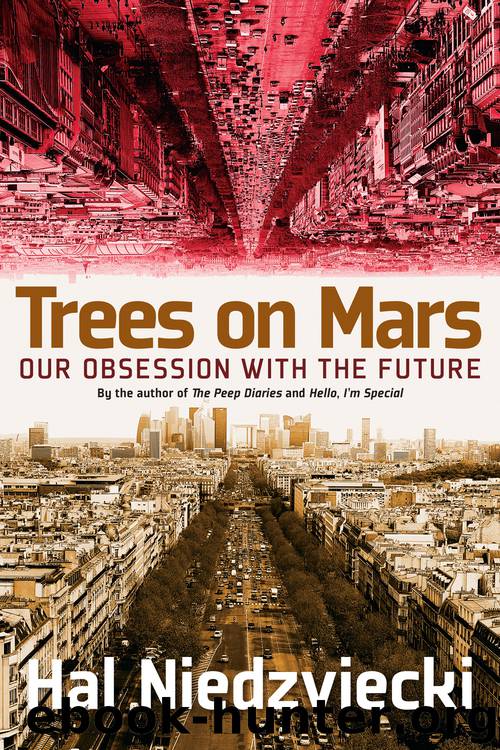Trees on Mars by Hal Niedzviecki

Author:Hal Niedzviecki
Language: eng
Format: epub
Tags: future studies, history, sociology, technology, global, culture, critic, society, peep diaries, college, factories, economics, business, non-fiction
Publisher: Seven Stories Press
Published: 2015-10-20T04:00:00+00:00
° ° ° ° ° °
Wherever we’ve gone, we always started out by killing and eating the biggest animals. They were slow, easy to track, and abundant in meat plus all kinds of other bonus items like fat and skins; we hunted them into oblivion in the relative blink of an eye. Naturalist writer James McKinnon describes in his book, The Once and Future World, a time roughly 250 million years ago when “large and fierce beasts” roamed. We primates were scared creatures huddled in caves. But over a relatively short period of time, the large fierce beasts came to have reason to fear us. We learned how to hunt them down with an efficiency redolent with the suggestion of our future ruthlessness. And so, our destiny reveals itself: over the time span of a mere 10,000 years, the giant fauna that had ruled our planet for more than ten million years were dispatched by what were once their much smaller, weaker, prey.7
This cycle would repeat itself again and again. Over the course of our tenure on Earth, human beings have managed to eliminate just about every larger animal species we came across wherever we came across it. And then, still hungry, we hunted the medium-sized creatures next, tracking down bison and caribou and deer (hard to believe now, but deer were almost extinct at one point in North America) before grabbing up the plentiful little beasts that used to scamper around us while we were busy hunting, skinning, and smoking their much larger peers. Very often, we starved a bit (or a lot) before realizing that we had no choice but to move onto a new food source or a new region. And then we wandered along into new territory to start the whole process over again until, in relatively short order, there was nowhere new left to go.
Only at that point, having, as McKinnon despairingly notes, “largely eliminated the mega-fauna of our age” did we get around to showing the slightest interest in changing our way of life, in “innovating.” Like Stephen Johnson’s clever microbes, we sought out new energy sources, desperate to diversify. But in the counter-narrative to the story of natural human creativity, this wasn’t an act of natural innovation, but an act of desperation. Writes the historian Clive Ponting:
Human societies did not set out to invent agriculture and produce permanent settlements. Instead a series of marginal changes were made gradually in existing ways of obtaining food as a result of particular local circumstances. The cumulative effect of the various alterations was important because they acted like a ratchet. Changes in subsistence methods often allowed a larger population to be supported but this made it difficult and eventually impossible to return to a gathering and hunting way of life because the extra people could not then be fed.8
It wasn’t our natural will to innovate that inspired many of the changes from hunter-gatherer to agrarian society—what Ponting calls “the first great transition.” It was hunger. From generation
Download
This site does not store any files on its server. We only index and link to content provided by other sites. Please contact the content providers to delete copyright contents if any and email us, we'll remove relevant links or contents immediately.
Hit Refresh by Satya Nadella(9132)
The Compound Effect by Darren Hardy(8965)
Change Your Questions, Change Your Life by Marilee Adams(7780)
Nudge - Improving Decisions about Health, Wealth, and Happiness by Thaler Sunstein(7706)
The Black Swan by Nassim Nicholas Taleb(7129)
Deep Work by Cal Newport(7083)
Rich Dad Poor Dad by Robert T. Kiyosaki(6632)
Daring Greatly by Brene Brown(6512)
Principles: Life and Work by Ray Dalio(6447)
Playing to Win_ How Strategy Really Works by A.G. Lafley & Roger L. Martin(6303)
Man-made Catastrophes and Risk Information Concealment by Dmitry Chernov & Didier Sornette(6019)
Big Magic: Creative Living Beyond Fear by Elizabeth Gilbert(5771)
Digital Minimalism by Cal Newport;(5764)
The Myth of the Strong Leader by Archie Brown(5507)
The Slight Edge by Jeff Olson(5417)
Discipline Equals Freedom by Jocko Willink(5389)
The Motivation Myth by Jeff Haden(5212)
The Laws of Human Nature by Robert Greene(5208)
Stone's Rules by Roger Stone(5087)
